Outdoors - All-terrain tots
Ruth Thomson
Monday, June 11, 2018
It’s hard, physical work for babies and young infants to be outdoors all day, but they are rising to the challenge at Millie’s Garden in Bristol, Nicole Weinstein discovers

Crawling up and down steep slopes and clambering over uneven ground, including logs and rocks, are just some of the daily physical activities that babies and young children engage in at Millie’s Garden, in East Bristol. Children at the childminding setting enjoy the freedom of a 60m-long garden, which backs onto a nature reserve.
‘Our youngest cohort, currently aged 14 months and 23 months, have both been at the setting for a year – and we are settling in another 16-month-old. They spend up to five hours a day engaged in physical activity but they are very motivated to keep moving, exploring and challenging themselves,’ explains childminder Millie Colwey (pictured), who is also a qualified Forest School leader and has a BA in early childhood education.
 Millie works alongside her husband Sam, a primary school teacher, providing care for six pre-school-aged children over three days a week. She explains, ‘We are typically outdoors from 8.30am to 5pm, but we sometimes eat lunch indoors, particularly if it’s very cold or wet outside.
Millie works alongside her husband Sam, a primary school teacher, providing care for six pre-school-aged children over three days a week. She explains, ‘We are typically outdoors from 8.30am to 5pm, but we sometimes eat lunch indoors, particularly if it’s very cold or wet outside.
‘We have everything we need to be entirely outdoors: a handwashing sink with hot running water, a camping toilet, an insulated cabin with lighting and electricity, a fire circle, and even a polytunnel which has been transformed into a dedicated art studio for children.’
THE WILD GARDEN
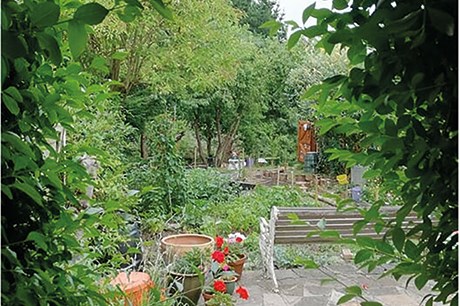
When Millie and her husband bought the property in July 2016, the garden was completely overgrown, with lots of old, unhealthy trees alongside mature, native ones and wild flowers. The couple had six weeks to clear it before they began childminding from their new registered premises.
‘From our old property, we childminded in a more traditional “indoor” way,’ Millie explains. ‘But after becoming a Forest School leader and seeing the benefits of taking the children outdoors for unstructured learning, it was my dream to provide this style of provision. I am also heavily inspired by the Reggio Emilia approach; it informs how I view the children as competent, capable, powerful rights-holders.’
The couple have slowly been making changes that are sensitive to the wildlife and natural features of the garden. It attracts a broad range of wildlife, including foxes, badgers, newts, slow worms, bats and a range of birds, from woodpeckers and owls to herons and buzzards. The children make regular visits to the nature reserve. Research projects with the children have influenced how the garden has developed. These include installing a purpose-built art studio, an allotment and a small pond.
DAY TO DAY
Visitors to Millie’s Garden often describe it as ‘peaceful’ and observe how deep children’s levels of involvement are. The natural environment is calm and uncluttered, allowing babies to focus on their activity and eliminating the risk of over-stimulation. There is a cabin full of resources such as magnifiers, binoculars, bug pots and wildlife books, but the babies are much more interested in investigating the natural features – earth, plants, wildlife, water and natural loose parts such as pinecones and sticks – and the sights, sounds, smells and textures seem to spark their endless curiosity.
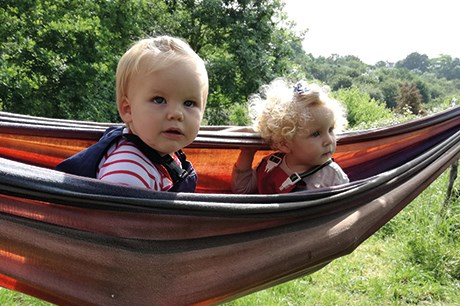
As they get older, the children are more likely to select resources to use, particularly small versions of things that they see adults using during sessions – for example, watering cans or trowels.
So, from an early age, children are able to work in groups and participate in important aspects of outdoor education, such as tending the animals and vegetable plots and encouraging wildlife into the garden.
A professional standard trapeze, a slackline and rope swings are obviously out of bounds to the setting’s youngest children, but Millie has installed a few alternatives for them to enjoy, including bucket swings and hammocks.
Activities throughout the whole day are child-directed. The older children typically engage in a lot of imaginative play and enjoy helping out in the garden. The babies explore and also like joining in with gardening tasks such as digging and watering.
‘Simply moving around, crawling on uneven surfaces, clambering over logs, climbing up slopes and using their core strength to get themselves down the slope is hard work for a baby or young infant,’ explains Millie. As a result, they develop “excellent” physical skills, including co-ordination and balance as well as stamina. This, in turn, says Millie, ‘naturally leads to babies and young children with a broad range of positive learning dispositions; for example, resilience, perseverance, willingness to engage in risk and challenge and excellent problem-solving skills’.
CHALLENGES
Being based outdoors in a wild, natural setting presents a unique set of risks that need to be managed. Importantly, these risks change constantly – for example, risk of hypothermia in the winter, sunburn in the summer or poisoning from certain plants at different times of the year.
When new children join the setting, most of the teaching is focused on managing these risks, and involves lessons in proper handwashing, and identifying harmful plants and fungi and what to do if the children come into contact with them.
But it is ‘much more difficult with babies’, explains Millie. ‘When they crawl, they are more likely to come into contact with ground-level hazards like fungi and animal faeces and are more likely to put things in their mouths.’
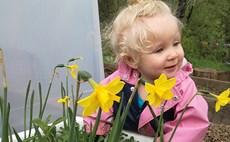 Before the children arrive, a full scan of the site is essential, and any hazards are removed. ‘Supervision is key,’ explains Millie. ‘They should be allowed space from adults and freedom to take risks, but we need to watch them carefully all of the time to ensure they don’t pick mildly toxic leaves, flowers and fungi that are common in wild spaces and gardens.
Before the children arrive, a full scan of the site is essential, and any hazards are removed. ‘Supervision is key,’ explains Millie. ‘They should be allowed space from adults and freedom to take risks, but we need to watch them carefully all of the time to ensure they don’t pick mildly toxic leaves, flowers and fungi that are common in wild spaces and gardens.
‘What I stress to parents is that the risks are not higher, they’re just different from the risks indoors. In fact, accidents seem to be more common when we use the indoor space, with hard surfaces, furniture and tighter spaces to negotiate.’
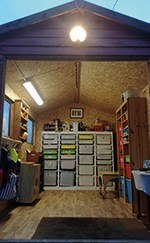 Keeping warm is another key challenge for babies throughout the winter. Before they walk, they are less physically active than their older peers, making it difficult for them to move around enough to keep warm. The insulated cabin, polytunnel and even the family home are always available when the infants indicate that they have had enough of the cold.
Keeping warm is another key challenge for babies throughout the winter. Before they walk, they are less physically active than their older peers, making it difficult for them to move around enough to keep warm. The insulated cabin, polytunnel and even the family home are always available when the infants indicate that they have had enough of the cold.
Millie observes, ‘Children who have been in an outdoor setting from a very young age are more open-minded about the environment and its changing features, including the weather. It can be much harder to settle in an older child who has very little experience of playing outdoors in all weathers. In my experience, these children are more likely to be anxious about rain, dirt and insects.’
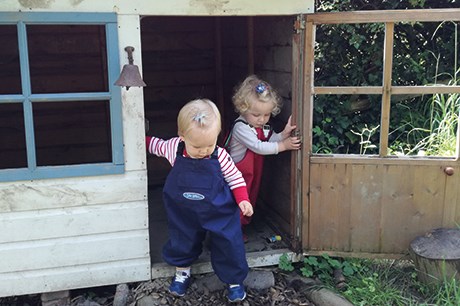
Case study: Dilys, aged 14 months
Millie’s daughter, Dilys, was just five weeks old when Millie returned to work as a childminder and has been joining her for full days outdoors since then. She is now 14 months old.
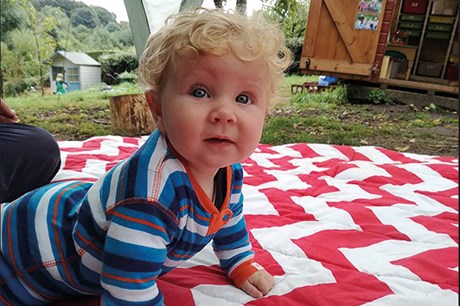
As a spring-born baby, she was very content to be outdoors lying in patches of long grass, watching it sway and trying to grasp it or lying under trees and watching the leaves and branches. She was curious about sounds like birdsong, turning her head toward them, and would smile at sensations like a strong breeze. She also spent a great deal of time snoozing in a sling.
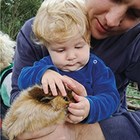 Millie says, ‘Long before she could crawl, she learnt to slide backwards down the steep slopes of our garden, pushing with her hands. And when she could eventually crawl she earned the nickname “the all-terrain baby” because she was never deterred by obstacles, crawling confidently over rocks, logs, long grass and up very steep climbs.
Millie says, ‘Long before she could crawl, she learnt to slide backwards down the steep slopes of our garden, pushing with her hands. And when she could eventually crawl she earned the nickname “the all-terrain baby” because she was never deterred by obstacles, crawling confidently over rocks, logs, long grass and up very steep climbs.
‘At 11 months old, while she was still in the crawling and cruising phase, we experienced the heaviest snowfall to hit Bristol in several years. She was not at all fazed by this, playing interestedly with snow and ice. She found getting around difficult but soon discovered being pulled around by adults and older children in a sledge was a great deal of fun.
‘She has now been walking for less than a month, but her confidence is noticeable. She walks confidently up and down steep slopes, on very uneven ground and different surfaces – slippery mud, wet grass, wood chips, uneven paving stones and overgrown woodland floor.
‘Her balance and co-ordination are excellent. She can walk while carrying a relatively heavy item, like a bottle of water. She is very aware of her surroundings, really looking at the ground and predicting how she needs to navigate it. These might sound like simple skills, but they are ever so challenging for such a new walker.
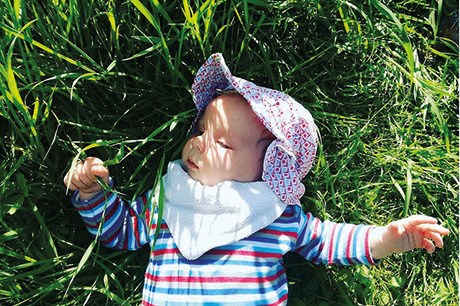
‘Above all, she shows an impressive amount of resilience. She falls and tumbles but usually gets herself up and continues without any fuss; she is always ready to try again. And it’s clear to see her excellent thinking skills as she tries a new approach or problem-solves her way over a large log. She is developing learning characteristics that will serve her well throughout her life.
‘At 14 months old, she is now becoming very curious about different features in the environment. When the older children are helping us water the allotment, she observes them closely and then brings a watering can to the hose, having it filled with water then, carrying it up and down the path, “joining in”. She notices small creatures like bees with much interest. She has learnt how to pick handfuls of grass and feed them to our pet rabbits. I know over the next few years her involvement in all aspects of life at Millie’s Garden will deepen.’
Millie’s Garden clothing tips
Red Waterproof Mette Set, £40 from www.raindrops.co.uk
Luxury Merino Wool & Bamboo Baby Body Suit, £22, www.raindrops.co.uk
Pure wool jumpers and socks are essential




